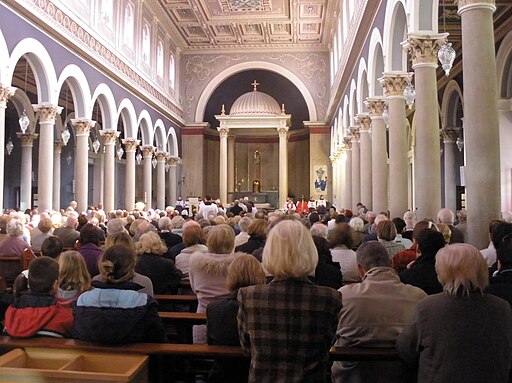 In terms of church attendance, Christmas and Easter always drew the biggest crowds in the church I was forced to attend as a child. There were a handful of other religious holidays where one would typically see a spike in attendance, but these were the big ones where the church really filled up.
In terms of church attendance, Christmas and Easter always drew the biggest crowds in the church I was forced to attend as a child. There were a handful of other religious holidays where one would typically see a spike in attendance, but these were the big ones where the church really filled up.When we would attend church on these occasions, I remember my parents expressing concern about not wanting to be perceived as the sort of people who only went to church on these holidays. Evidently, that was a really bad thing to be known as. This concern never made much sense to me. We certainly did not go every Sunday, but we went quite a bit. And the only reason we wouldn't go would be if we were driving back from a weekend spent out of town or someone was sick. Nevertheless, this was a real concern for them.
Over time, I would hear enough comments from the adults with whom my parents interacted at church to discern that this particular concern was based in reality. The more regular church goers did indeed look down on those who only seemed to show up around the holidays, and they were not terribly shy about making this known. They would make snide comments to the irregular attenders and talk quite a bit of trash about them behind their backs. I remember being surprised by how widespread this seemed. Even the ministers would periodically comment, "I haven't seen you here in awhile" and that sort of thing. They always did it with a smile, but the message was undeniable.
As a child, I was initially puzzled by this behavior because it seemed to contrast so sharply with what we were being taught about Jesus. But as I began to notice more and more hypocrisy on the part of the people I encountered at church, I slowly came to realize that almost nobody behaved as if they believed much of what we were being told. With a few exceptions, the people who filled the pews seemed to be there primarily so they would be seen there. They were dressed up like peacocks and decked out in expensive jewelry and always seemed to look around when they put money in the collection plate to make sure someone noticed how much they were depositing. What did any of this have to do with Jesus?
Years later, I would come to understand that much of what I observed during those days trapped in church was about conformity. This was an elaborate system that existed primarily for the purpose of assuring its continued existence. Guilt and concern over one's reputation were powerful influences on one's decision to attend. There was indeed a social price to be paid by those who attended irregularly or not at all.
I would also come to understand that the sickening hypocrisy I witnessed on those days is not remotely unique to Christians or other religious believers. I found the hypocrisy I observed in church so striking at the time because it was the first time I had experienced such blatant form of it in a place I thought was supposed to be free of that sort of thing.
I recognize that the people who attend church do so for a variety of reasons. For a small few, it may really be about worship of some sort. But for many more, it seems to be about other things (e.g., socializing, being seen as sufficiently pious). And some of these other things do indeed smack of hypocrisy.